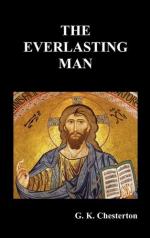
|
| Name: _________________________ | Period: ___________________ |
This test consists of 15 multiple choice questions and 5 short answer questions.
Multiple Choice Questions
1. What does Chesterton say of the dark side of paganism or mythology?
(a) It is more practical than the light side.
(b) They have a feeling of no nonsense about them.
(c) All of these.
(d) It is less poetical than the light side.
2. According to Chesterton, how do civilization and barbarism interact?
(a) They have always existed side-by-side.
(b) Civilization is a reaction to barbarism.
(c) None of these.
(d) They return in cycles.
3. To what popular religious practice of his time does Chesterton object?
(a) The worship of the entirety of mankind as a supreme being.
(b) Mass in English.
(c) Incorporating localized traditions into religious practice.
(d) Reading religious texts as metaphors.
4. What two civilizations does Chesterton use for evidence against much of the belief in his time about cave men?
(a) Rome and Greece.
(b) Egypt and Babylon.
(c) Egypt and Mazatlan.
(d) Egypt and Rome.
5. What does Chesterton attempt to prove by the universality of clothes?
(a) How ill designed mankind is to survive like a beast.
(b) The need for decoration and artistic expression.
(c) The concept of original sin.
(d) Virtue in cave men.
6. What does Chesterton imply made the difference in the battle of Carthage and Rome?
(a) The dedication of the soldiers.
(b) The nature of their religion.
(c) The prowess of their military commanders.
(d) The financial backing.
7. What does Chesterton say is the simplest truth about mankind?
(a) Mankind is made in the image of God.
(b) Mankind is a very strange being.
(c) Mankind is a microcosm of the universe.
(d) Mankind is the only religious being.
8. What religious activity does Chesterton align with Carthage?
(a) Prayers for materialistic ends.
(b) Infanticide.
(c) Devil worship.
(d) All of these.
9. Which of the following is something Chesterton says future scientists will deduce from 20th Century initials carved in stone?
(a) The 20th Century had no religion.
(b) The 20th Century did not practice the art of sculpture.
(c) The 20th Century had no cursive or small letters.
(d) All of these.
10. Why does Chesterton claim that some people have difficulty perceiving Christianity correctly?
(a) Their personal experiences as Christians get in the way.
(b) They cannot separate the religion from history.
(c) All of these.
(d) They are too close to it.
11. Where does Chesterton say the history of Rome is best understood?
(a) None of these.
(b) In her politics.
(c) In the blood of the Colosseum.
(d) In the whispers behind doors.
12. Who or what does Chesterton credit with the preservation of the true religion of mankind?
(a) God.
(b) The Jews.
(c) Natural law.
(d) Human nature.
13. What does Chesterton label as the biggest weakness of science in trying to understand the origins of man?
(a) Theories that are sensational but untrue.
(b) None of these.
(c) The scientists.
(d) The inability to experiment or directly observe.
14. Which of the following does Chesterton note it is important to remember about the psychology of myths?
(a) They contain all shades of sincerity.
(b) They are often strictly local.
(c) All of these.
(d) They contain all shades of insincerity.
15. According to Chesterton, how does monotheism become polytheistic?
(a) None of these.
(b) Mankind fears the largeness of a single god and so creates others.
(c) Dissention about the details of the one God create different versions of what was originally just one.
(d) Through the amalgamation of other pagan religions.
Short Answer Questions
1. What does Chesterton take as evidence that evolution is flawed as a way to define the origins of man?
2. What does Chesterton refer to as a cornerstone of humanity?
3. Despite the level of sincerity a myth might be understood, what does Chesterton say is still present?
4. What does Chesterton say is the main fault with comparing religions?
5. Which one of the following is NOT, according to Chesterton, one of the great mysteries?
|
This section contains 662 words (approx. 3 pages at 300 words per page) |

|




